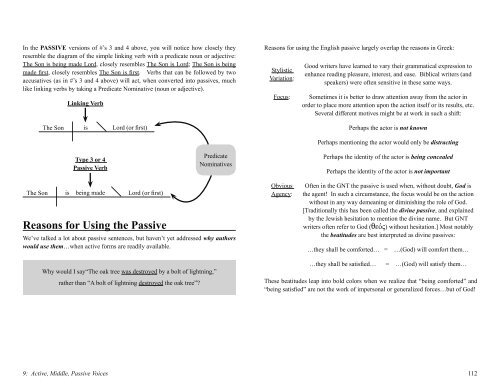Elementary New Testament Greek, 2014a
Elementary New Testament Greek, 2014a
Elementary New Testament Greek, 2014a
You also want an ePaper? Increase the reach of your titles
YUMPU automatically turns print PDFs into web optimized ePapers that Google loves.
In the PASSIVE versions of #’s 3 and 4 above, you will notice how closely they<br />
resemble the diagram of the simple linking verb with a predicate noun or adjective:<br />
The Son is being made Lord, closely resembles The Son is Lord; The Son is being<br />
made rst, closely resembles The Son is rst. Verbs that can be followed by two<br />
accusatives (as in #’s 3 and 4 above) will act, when converted into passives, much<br />
like linking verbs by taking a Predicate Nominative (noun or adjective).<br />
Linking Verb<br />
The Son is Lord (or rst)<br />
Reasons for using the English passive largely overlap the reasons in <strong>Greek</strong>:<br />
Stylistic<br />
Variation:<br />
Focus:<br />
Good writers have learned to vary their grammatical expression to<br />
enhance reading pleasure, interest, and ease. Biblical writers (and<br />
speakers) were often sensitive in these same ways.<br />
Sometimes it is better to draw attention away from the actor in<br />
order to place more attention upon the action itself or its results, etc.<br />
Several different motives might be at work in such a shift:<br />
Perhaps the actor is not known<br />
Type 3 or 4<br />
Passive Verb<br />
Predicate<br />
Nominatives<br />
Perhaps mentioning the actor would only be distracting<br />
Perhaps the identity of the actor is being concealed<br />
Perhaps the identity of the actor is not important<br />
The Son is being made Lord (or rst)<br />
Reasons for Using the Passive<br />
We’ve talked a lot about passive sentences, but haven’t yet addressed why authors<br />
would use them…when active forms are readily available.<br />
Obvious<br />
Agency:<br />
Often in the GNT the passive is used when, without doubt, God is<br />
the agent! In such a circumstance, the focus would be on the action<br />
without in any way demeaning or diminishing the role of God.<br />
[Traditionally this has been called the divine passive, and explained<br />
by the Jewish hesitation to mention the divine name. But GNT<br />
writers often refer to God () without hesitation.] Most notably<br />
the beatitudes are best interpreted as divine passives:<br />
…they shall be comforted… = …(God) will comfort them…<br />
Why would I say“The oak tree was destroyed by a bolt of lightning,”<br />
rather than “A bolt of lightning destroyed the oak tree”?<br />
…they shall be satised… = …(God) will satisfy them…<br />
These beatitudes leap into bold colors when we realize that “being comforted” and<br />
“being satised” are not the work of impersonal or generalized forces…but of God!<br />
9: Active, Middle, Passive Voices<br />
112


















